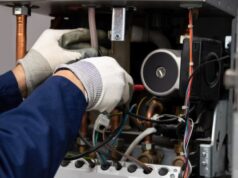
There are many different types of heaters, and many different sorts of fuels you can use to heat your home. Find out how each compares in terms of energy efficiency and greenhouse gas emissions.
Every type of heater operates differently – some better than others. But determining which type is the most efficient requires a good look not just at the fuel different heaters use, but also at the way in which they’ll be used. This includes things like the size of the area that’s being heated, the temperature to which it’s being heated, and how well the area that’s being heated is insulated so that it will retain the heat that your heater’s producing.
An ‘energy efficient’ heater placed in a room that’s poorly insulated, which has big, single-glazed windows or which is unnecessarily large or tall will always mean you’re using more energy than necessary. Regardless of the type of heater you’re using, the best thing you can do for efficient heating is to design and build your house with that in mind from the outset.
Having said that, it’s still definitley worth comparing how heaters and different types of fuels compare, if all other things are equal…
Fuel types

When you consider the different fuel types, there are some that clearly perform better than others and which are vastly more efficient. Solar heaters are fairly obviously the most efficient. When implemented properly they can be very effective at producing heat, cost nothing to run and don’t cause any CO2 emissions.
Gas fuelled heaters are the best of the rest – they are affordable and very effective at producing heat, and their use creates substantially less in terms of CO2 emissions than other fuel types. Electricity, while an effective and convenient fuel source, is expensive by comparison and far worse in terms of greenhouse gas emissions. Solid fuels are affordable, but also produce varying degrees of greenhouse gas emissions (depending on the solid fuel used).
Heater types
All solar and geothermal heaters and most gas heaters (including gas furnace heaters and hydronic heating) are extremely energy efficient – although gas heaters running on LPG tend to be more expensive to run.
Solid fuel burners – range from extremely efficient (slow combustion wood heaters) to very inefficient (poorly designed pot bellied stoves and fireplaces).
Electric heaters range from very inefficient (radiant bar heaters, oil-filled column heaters, convective electric fan heaters and electric in-slab heating) to reasonably efficient (reverse cycle air conditioners/heat pumps and off-peak heat banks). It’s important to remember that the efficiency of electric heaters is relative, because electricity produces much more in terms of CO2 emissions than other fuel types.
Selecting an energy-efficient fuel source and heater is a good idea, but using it for the wrong purpose can turn it into an inefficient heater, an ineffective heater, or both. Likewise, it’s important to remember that even ‘technically’ inefficient heaters are more appropriate in some situations. If you’re only going to require heat for an hour or two a day for a couple of weeks a year, it doesn’t make sense to go all out and install gas central heating in your home. A small electric panel, fan or bar heater may make better sense in those circumstances.






